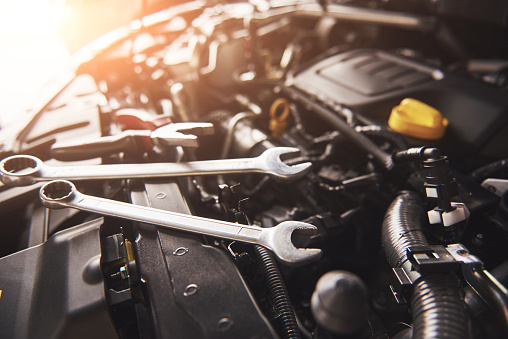February 19, 2023
6 SIGNS YOUR CAR NEEDS SUSPENSION REPAIR
Your car is made up of different parts, and each of these should function properly to ensure a smooth and safe ride. Using a car with damaged or malfunctioning parts will make it very challenging for you to control the car and prevent accidents on the road.
Although important, a car’s suspension system is often neglected. Generally, the suspension system allows the shocks and springs to absorb the energy of a bump to ensure a smooth ride. The suspension system also handles the movements of your car caused by braking and cornering.
Your car’s suspension system is important for many different reasons, which is why you should have it repaired the moment you notice any of the signs listed below.
The sooner you have your vehicle’s suspension repaired, the sooner you can experience a safe and smooth ride again.
1. Your Car Nose Dives When You Hit a Bump
One of the easiest ways to determine the condition of your car’s suspension system is to pay attention to your car whenever you hit a bump on the road. Seeing the front of your car dive down as you hit the brakes and continue to bounce after going over the bump is a red flag that your suspension system is failing.
As your car’s suspension system wears out, expect that its ability to stop decreases, along with the vehicle’s shock absorbers. Driving this kind of car can compromise your comfort and safety, along with that of your passengers.
Keep in mind that one of the biggest roles of your suspension system is to smooth out bumps on the road to ensure that you remain comfortable behind the steering wheel. If you no longer experience this, the struts or shock absorbers in your suspension system might be damaged.
2. Your Car Produces Clunking Noises When in Motion
Your car is made up of different parts, and these parts usually make a sound when in motion. But, if you notice unusual squeaking and clunking every time you drive over a bump, that’s another story. Hearing clunking noises is usually a sign that your suspension system needs a repair ASAP.
Your car’s suspension system acts as a shock absorber by capturing the change of energy every time you drive through bumps. When your car’s suspension system can no longer absorb the shock from dips and bumps, expect that it will produce unusual noises.
3. Your Steering Wheel Is Vibrating or Shaking
The steering wheel and its system control the direction of the vehicle. This part of the vehicle converts your rotational commands into swiveling movements of the vehicle’s front wheel. Without a fully functioning steering wheel, you’ll have a hard time driving.
Pay attention to how your steering wheel operates. Is it shaking or vibrating excessively? Can you easily control your steering wheel? If not, your car’s suspension system might need repair.
Having problems controlling your steering wheel or dealing with excessive shaking and vibrating usually means that the tie rods, springs, or control arms in your car’s suspension system are broken. These problems will cause severe difficulty in steering and prevent you from controlling your car beyond casual pulling or drifting.
4. Your Car Pulls to One Side
The structure of your car aims to balance weight on both sides, regardless of how uneven the pavement you’re driving on is. Because of the number of wheels it has, you should not have any problems driving through sharp curves or down a straight road with your car.
Noticing that your car pulls to one side when driving could mean two things: either you have poor wheel alignment, or your shock absorbers need repair.
If the problem still persists even after checking your alignment, a damaged suspension system might be the culprit.
Related: Is It Dangerous To Drive With Bad Alignment?
To confirm, look for any signs of damage on the control arms, ball joints, and shock absorber of your suspension system. If you notice problems in these areas, call a professional mechanic right away.
5. You Notice Excessive or Uneven Tire Wear
If you’ve noticed that the tires on one side of your car are increasingly looking worn down, are pulling to the side, or feel at all misaligned, you may need to get your suspension looked at. If your suspension is weakened or worn, this will likely be putting increased pressure on one side of the car, leading to uneven wear.
Therefore, excessive tire wear is something to look out for on a regular basis.
6. You Spot Visible Signs of Damage
Contrary to popular belief, you don’t have to be an expert mechanic to determine the condition of your car’s suspension system. Visible signs of damage to the car (such as a scrape or dent on the body) after having hit a pothole, curb, or another object could be the sign you need to go and get your car checked out.
A strong hit to your car is something that can easily cause suspension damage, so if you’re feeling any of the above signs, visit a mechanic.
Getting underneath your car and checking its shock absorbers is also usually enough to assess if your car’s suspension system is still working fine or not.
What are the signs of car suspension problems?
5 Signs Your Vehicle's Suspension Has A Problem Uncomfortable Ride. Squeaking, Clanking Or Knocking Noise. ... Vehicle Leans When Parked. ... Vehicle Bounces Or Dives Over Bumps. ... Loose Handling or Play in the Steering Wheel. The suspension and steering systems on your car are intimately linked. ...
What is the average life of car suspension?
While the longevity of a suspension system can vary based on many factors, including driving habits or road conditions, it typically lasts for 50,000 to 100,000 miles. For many drivers, it's time to replace the suspension system's shocks or struts after seven or eight years of use

